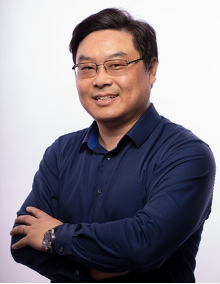J. Joshua Yang

Arthur B. Freeman Chair Professor of Electrical Engineering and Computer Engineering
University of Southern California
Date: December 5, 2025
Time: 1:00 – 2:00 PM ET
Location: Grier 34-401A
Reception to follow.
Watch the livestream
Submit your questions
ABSTRACT
Memristors can be broadly categorized into diffusive and drift types, distinguished by their reset switching mechanisms. Diffusive memristors reset through spontaneous ion diffusion under zero bias, exhibiting dynamics that closely resemble biological ionic processes, making them particularly attractive for processing temporal information. Drift memristors, in contrast, rely on electric-field-driven ion migration, offering highly stable and tunable analog resistance states that are well suited for storing long-term information. The synergistic integration of diffusive and drift memristors enables the design of compact, energy-efficient, and biorealistic neuromorphic hardware. This talk will present recent progress in device engineering, array-level integration, and application demonstrations, highlighting their potential to advance next-generation computing hardware for machine learning and artificial intelligence.

BIOGRAPHY
Dr. J. Joshua Yang is the Arthur B. Freeman Chair Professor of Electrical and Computer Engineering in the Ming Hsieh Department of Electrical and Computer Engineering at the University of Southern California (USC). He joined USC in 2020, coming from the faculty of the University of Massachusetts, Amherst. Specializing in post-CMOS hardware for neuromorphic computing, machine learning, and artificial intelligence, he has published many groundbreaking research papers in these domains. His innovative work has led to the granting of over 120 US patents.
Yang is the Associate Editor of Science Advances on neuromorphic topics and the founding chair of the IEEE Neuromorphic Computing Technical Committee (2021). He serves as the director of an Air Force-funded Center of Excellence on Neuromorphic Computing at USC. Recognized as a Clarivate Highly Cited Researcher and listed among the Top Best Scientists in the Electronics and Electrical Engineering category by Research.com, he was elected Fellow of the IEEE (2022) and of the National Academy of Inventors (NAI) (2023), for his contributions to resistive switching materials and devices for nonvolatile memory and neuromorphic computing.
